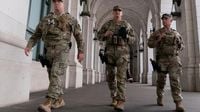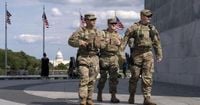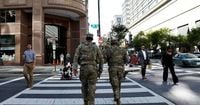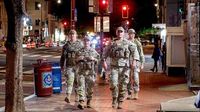On September 14, 2025, national headlines erupted with reports that the Trump administration is weighing a dramatic new approach to law enforcement in Louisiana: deploying up to 1,000 National Guard troops to the state’s largest cities. The plan, detailed in leaked Pentagon draft documents obtained by The Washington Post, would see the Guard supplementing local police in New Orleans, Baton Rouge, and other urban centers—if Republican Governor Jeff Landry requests such assistance. The proposal, though not yet enacted, has already set off a fierce debate about crime, politics, and the militarization of American city streets.
According to Reuters and The Washington Post, the draft documents outline a mission lasting through September 30, 2026, with no specified start date. The plan would keep National Guard troops under the governor’s control but funded by federal dollars, using Title 32 of the U.S. Code. This legal arrangement sidesteps the Posse Comitatus Act, which restricts the use of federal troops for domestic law enforcement, by allowing the Guard to operate in a law enforcement capacity while still under state authority. Defense Secretary Pete Hegseth’s unsigned, undated memo to Attorney General Pam Bondi and Homeland Security Secretary Kristi Noem reportedly emphasizes the "unique advantage" of this approach for Louisiana.
The Pentagon, when pressed for comment, confirmed the authenticity of the documents but was quick to distance itself from the proposal. “Leaked documents should not be interpreted as policy. We will not discuss these plans through leaked documents, pre-decisional or otherwise,” a spokesperson told Reuters and Straight Arrow News. Lt. Col. Noel Collins, spokesperson for the Louisiana National Guard, echoed this uncertainty, stating, “Just because the Pentagon's working plans does not mean that that's down to our level yet.” As of September 13, 2025, Collins said the Guard had not received any orders related to the plan.
President Donald Trump, meanwhile, has made no secret of his desire to crack down on crime in Democratic-led cities. In a Fox News interview on September 12, he described New Orleans as “in really bad shape” and boasted, “I can fix that up in a week and a half.” Earlier this month, Trump mused publicly about sending the Guard to Memphis, Tennessee, and even floated the idea of deployments to Chicago—though he ultimately decided against the latter after pushback from Illinois officials. Trump told reporters at a meeting with Polish President Karol Nawrocki, “We’re making a determination now — do we go to Chicago or do we go to a place like New Orleans, where we have a great, Gov. Jeff Landry, who wants us to come in and straighten out a very nice section of this country that’s become quite tough, quite bad?”
Governor Jeff Landry has not officially requested the deployment, but he has signaled openness to federal help. On September 3, Landry posted on X (formerly Twitter), “We will take President @realDonaldTrump’s help from New Orleans to Shreveport!” In August, Landry approved the deployment of about 135 Louisiana National Guard soldiers to Washington, D.C., as part of a separate operation. Still, Landry’s office has declined to comment directly on the leaked proposal, with a spokesperson telling The Advocate that they would not address “leaked or pre-decisional documents.”
The draft plan’s stated aim is to supplement law enforcement in high-crime neighborhoods, providing logistical and communications support. The Pentagon documents also mention “clear rules of engagement and community outreach protocols to ensure transparency and public trust.” However, the specifics—such as whether troops would have arrest authority—remain unclear. Retired U.S. Army General Randy Manner, former acting vice chief of the National Guard, called the plans “nothing more than a political grab of power” and said, “I’ve never heard of this kind of thing happening before this administration — not in my 35 years” of military service, according to WVUE.
Local and state officials have voiced a mix of skepticism and concern. U.S. Representative Troy Carter, Sr., D-New Orleans, was especially blunt: “The facts matter: New Orleans is experiencing the lowest crime rates in decades, with homicides and overall crime trending downward. There is no ‘emergency’ that justifies militarizing our city streets. If the President truly wants to help Louisiana and New Orleans, he should focus on real solutions.” Carter added, “No formal request has been made by Louisiana’s leadership, and New Orleans should not be used as a testing ground for speculative, politically motivated plans.”
Statistics compiled by the Metropolitan Crime Commission support Carter’s claim: in 2025, homicides in New Orleans are down 13 percent, non-fatal shootings down 14 percent, carjackings down 37 percent, and armed robbery down 22 percent compared to the previous year. Violent crime in the city has been on the decline after a spike in the early years of the COVID-19 pandemic, with projections indicating the fewest murders since the early 1970s.
Others in Louisiana’s political sphere see potential merit in the proposal. Shane Guidry, a New Orleans businessman and confidant of Governor Landry, argued that cities struggling to keep police departments fully staffed could benefit from federal support. “My understanding is they are getting prepared for governors that want help,” Guidry said. “And they are also getting prepared for cities that need help. Trump has been real clear on TV that he’s coming to other cities. We’ll have to see what that is.” Alexandria Mayor Jacques Roy noted his city’s success in reducing gun-related homicides by 60 percent since he took office but welcomed additional resources: “With focus, those resources could make a real difference and are welcome.”
East Baton Rouge Parish Mayor-President Sid Edwards was more cautious, stating, “It is premature for me to comment on this matter as I’ve yet to hear anything about sending troops to Louisiana. I will say that we are severely short of Law Enforcement Officers in Baton Rouge.”
Not everyone is convinced that a National Guard deployment is the right answer. More than a dozen residents of Shreveport, Louisiana, told Reuters they viewed any such deployment as more of a political stunt than a serious crime-fighting solution. Democratic leaders nationally have echoed this sentiment, arguing that the move is less about public safety and more about projecting federal power in Democratic strongholds. “Our National Guard must remain ready for genuine emergencies, like hurricanes and natural disasters — not diverted into political experiments in law enforcement,” Carter said. “Louisiana deserves resources, respect and genuine partnership, not militarization.”
There’s also the practical concern that the deployment would tie up 11 percent of Louisiana National Guard personnel who are typically available for emergencies during hurricane season—a fact not lost on critics in a state all too familiar with natural disasters.
As the debate rages, one thing is clear: the Trump administration’s proposed National Guard deployment in Louisiana has become a flashpoint in the broader conversation about crime, federal authority, and the balance between public safety and civil liberties. With no formal request made and no official orders issued, the future of the plan remains uncertain. But the political and social ripples from the leaked documents are already being felt across Louisiana and beyond.




